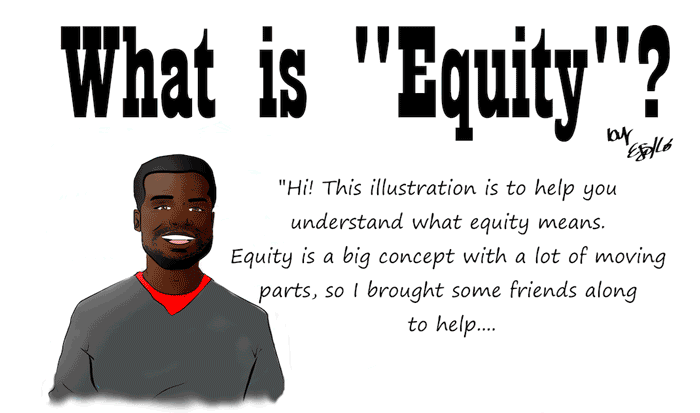To Salomé Chimuku, already a veteran of social justice and public policy reform at age 25, equity is a familiar concept.
“It’s just a new label,” says the first prize winner of Equity Illustrated, a design contest sponsored by Meyer Memorial Trust and Northwest Health Foundation
“Equity is the biggest safeguard against fear,” she says. “The more you understand equity, the more compassionate you become. You’re understanding where someone is coming from.”
Salomé’s family immigrated to the United States from Angola after generations of armed conflict: a 42-year long fight for independence followed by a 37-year civil war. Both her grandparents and parents were born into war. The idea that inequities lead to strife was drilled into Salomé at an early age.
“My dad really tried to instill in me the idea that fear is the easiest thing to build, but it’s unsustainable. Love is the hardest thing to build but it will last you forever.”
In her first place entry, Salomé sketched a series of faces in a comic-strip style, each of them talking about a facet of equity. The comic is based in reality: The people are her friends, the words, their own. When family dinner conversations revolve around equity, and what you do for a living is focused on equity, and your friends also work for social justice, equity becomes a frequent topic of conversation, explains Salomé.
The contest was her first, although she’s been creating art for many years as a coping mechanism for complex post-traumatic stress disorder (PTSD).
“It’s a good way to express all the things that are going through your mind,” she says.
As a first-generation immigrant who is black, female and queer, Salomé believes the best equity conversations happen “when you remove pressures and folks can really be honest with themselves.” Sometimes those conversations happen at work, over drinks, or at a show. “You can be having a very deep conversation about equity and then (club music) comes on and you start dancing,” she says.
Salomé hopes the images help people understand how disparate resources can lead to unhappy outcomes.
Her professional work toward equity began during an internship at age 18 in the office of then-secretary of state Kate Brown. There, Salomé helped craft a program that registers new citizens to vote at their naturalization ceremonies — a policy now being adopted by other states. Since then, Salomé has worked on local legislation as the Director of Public Policy and Advocacy for Unite Oregon (formerly the Center for Intercultural Organizing), a Meyer grantee, and as a Politicorps Fellow for the Bus Project, an initiative funded by Meyer, NWHF and Brainerd Foundation.
Now her current assignment managing Oregon’s Law Enforcement Contacts Policy and Data Review committee (LECC) brings equity to law enforcement at the Criminal Justice Policy Research Institute, a governor-appointed committee charged with assisting Oregon law enforcement agencies with stop-data collection and analysis training, improving community relations and policy recommendations. Their tagline: “Using data and experience to influence policing policy that will create equitable outcomes for all Oregonians.”
“In a training, law enforcement officers may sit in a room and describe how they feel they’re being put in a box because of the actions of a few of their kind; but they don’t see the connection to groups that have been profiled who feel exactly the same way,” she says. “People don’t see their own bias, even at the micro level. I felt like Equity Illustrated was a good way to get people to think.”
View more of Salomé’s work on her Facebook page: https://m.facebook.com/ArtbyEsoko
A PDF version of Salomé’s winning illustration is available here.


